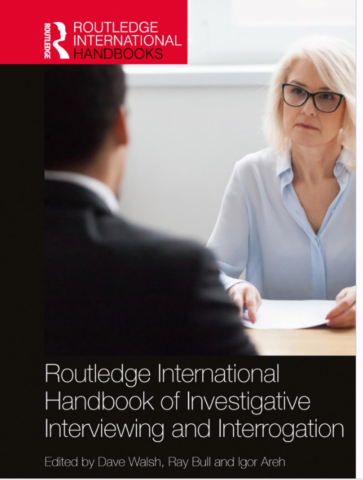Nowa pozycja w wydawnictwie Routledge
W wydawnictwie Routledge ukazała się kolektywna monografia pod tytułem "Routledge International Handbook of Investigative Interviewing and Interrogation". Jej edytorami są profesorowie z Wielkiej Brytanii David Walsh, Ray Bull i Igor Areh - znani specjaliści w dziedzinie tzw. przesłuchania poznawczego (ang.-investigative interviewing). Wśród autorów są badacze i praktycy z ponad 40 krajów, w tym spoza Unii Europejskiej. Dr hab. Denis Solodov, prof. UWM jest autorem rozdziału 28 "Rape victim interviews in Polish criminal procedure".
Monografia otrzymała pozytywne oceny niezależnych recenzentów i praktyków, w tym byłego UN Special Rapporteur on Torture Pana Profesora Juana E. Mendeza
Spis treści:
Introduction Part 1: Investigative interviews and interrogations with suspects, victims and witnesses 1.Interviewing of witnesses, victims, suspects in the Czech Republic Hedvika Boukalová and Julie Gábrišová 2.How cool can Mendez get? Investigative interviewing practices - an Icelandic perspective Eiríkur Valberg and Rebecca Milne 3.Is it interviewing or interrogation in Lithuania (or somewhere in between)? Aleksandras Izotovas, Ilona Laurinaitytė, Kristina Vanagaitė, and Neringa Grigutytė 4.Investigative interviewing in the Philippines: Victims/complainants, witnesses/informants, and suspects Rachelle Ballesteros-Lintao and Rudy B. Gahar 5.Police questioning, investigative interviews, and interrogations in the Republic of Serbia Zvonimir Ivanović, Valentina Baić, and Milan Oljača 6.Police interviewing in Spain: Gathering information from suspects, witnesses, and victims José Luis González, Jaume Masip and Jennifer Maria Schell-Leugers 7.Interviewing vulnerable witnesses and suspects in criminal justice proceedings: Evidence-based development in Taiwan Ching-Yu Huang and Chih-Hung Shih Part 2: Investigative interviews and interrogations with suspects 8.Interviewing and interrogating suspects: A theoretical, practical, and ethical model Christopher E. Kelly 9.The Méndez Principles: Suspects’ rights in criminal proceedings in Austria Gerrit Zach and Nóra Katona 10.Police interrogation of crime suspects: A study of current practices in Bangladesh Mohammed Bin Kashem and Ummey Sharaban Tahura 11.Police interrogation of suspects in Bosnia and Herzegovina Irma Deljkić and Adnan Fazlić 12.Interrogation of suspects in Brazil and a new path for policing William Weber Cecconello 13.The road to digitization: Transcription methods in Egyptian interrogations with suspects Neveen Al Saeed 14.Police interviewing practices with suspects in Greece and Cyprus Stavroula Soukara and Christina Kylla 15.Interrogation of suspects in Hungary Bence Mészáros and David Petrétei 16.Custodial police interrogation of suspects in India Prejal Shah 17.Interviewing suspects in the Republic of Ireland: Establishing some sort of PEACE in a search for the truth Adrian Gates, Yvonne Daly and Rebecca Milne 18.Investigative interviewing of suspects in Malaysia: Challenges and ways forward Kai-Li Chung and Haezreena Begum binti Abdul Hamid 19.Montenegro – Policing and the interrogation of suspects in relation to the Mendez Principles Marijana Cerovic 20.Police interviewing practices in Pakistan: A critical outline Rais Nouman Ahmed and Rashid Minhas 21.Investigative interviews of crime suspects in Singapore Jeffery Chin and Majeed Khader 22.Interviewing techniques in eleven Sub-Saharan African nations Patricia Donovan and Patricia Perez 23.Investigative interviews in Türkiye: Implications of the Mendez Principles in advancing the field Ahmet Demirden Part 3: Interviewing Victims and Witnesses 24.A “world” of insight? On the need to discover universal victim/witness interviewing principles Brent Snook and Kirk Luther 25.Access to justice for victims of sexual offenses and its implication within the forensic interviews process in Colombia Gladys Hernandez-Sarmiento 26.Mozambican police and judicial investigative interviewing Georgina Heydon and Eliseu Mabasso 27.Reporting domestic violence in a patriarchal Nigerian society: Exploring interviewing experiences of battered women with police investigators Richard Abayomi Aborisade 28.Rape victim interviews in Polish criminal procedure Denis Solodov Part 4: Interviewing Children and Young People 29.An overview of best practices for interviewing children Sonja P. Brubacher and Martine B. Powell 30.The role of the psychologist in the State Police in Albania: Focusing on the minor Valbona Treska, Elona Mustafaraj and Elidon Shehu 31.Investigative interviewing of children and young people in Chile Francisco Maffioletti Celedón and Lorena Contreras Taibo 32.Children’s testimony in Croatia Ante Novokmet and Zvonimir Tomičić 33.Developing investigative interviewing practice in Finland – starting from child victims and witnesses Hanna Lahtinen and Maria Hietajärvi 34.Interviewing child witnesses in Greece Olga Themeli and Fenia Ferra 35.Interviews with children in Lithuania Neringa Grigutytė, Ilona Laurinaitytė, and Aleksandras Izotovas 36.Investigative interviews with children in Türkiye: From the past to the present Huseyin Batman and M.Burak Gönültaş Conclusion: Towards a global understanding of what is effective interviewing for investigations and information gathering Dave Walsh, Igor Areh and Ray Bull




